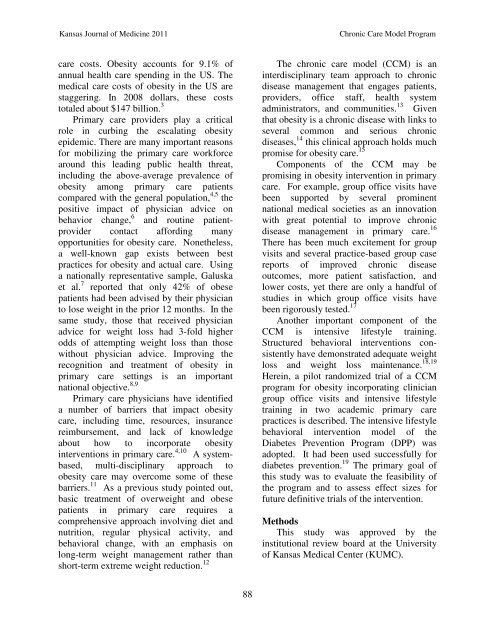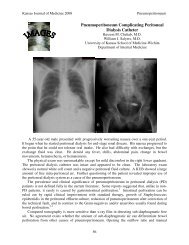A Chronic Care Model Program Incorporating Group Office Visits for ...
A Chronic Care Model Program Incorporating Group Office Visits for ...
A Chronic Care Model Program Incorporating Group Office Visits for ...
You also want an ePaper? Increase the reach of your titles
YUMPU automatically turns print PDFs into web optimized ePapers that Google loves.
Kansas Journal of Medicine 2011 <strong>Chronic</strong> <strong>Care</strong> <strong>Model</strong> <strong>Program</strong><br />
care costs. Obesity accounts <strong>for</strong> 9.1% of<br />
annual health care spending in the US. The<br />
medical care costs of obesity in the US are<br />
staggering. In 2008 dollars, these costs<br />
totaled about $147 billion. 3<br />
Primary care providers play a critical<br />
role in curbing the escalating obesity<br />
epidemic. There are many important reasons<br />
<strong>for</strong> mobilizing the primary care work<strong>for</strong>ce<br />
around this leading public health threat,<br />
including the above-average prevalence of<br />
obesity among primary care patients<br />
compared with the general population, 4,5 the<br />
positive impact of physician advice on<br />
behavior change, 6 and routine patientprovider<br />
contact af<strong>for</strong>ding many<br />
opportunities <strong>for</strong> obesity care. Nonetheless,<br />
a well-known gap exists between best<br />
practices <strong>for</strong> obesity and actual care. Using<br />
a nationally representative sample, Galuska<br />
et al. 7 reported that only 42% of obese<br />
patients had been advised by their physician<br />
to lose weight in the prior 12 months. In the<br />
same study, those that received physician<br />
advice <strong>for</strong> weight loss had 3-fold higher<br />
odds of attempting weight loss than those<br />
without physician advice. Improving the<br />
recognition and treatment of obesity in<br />
primary care settings is an important<br />
national objective. 8,9<br />
Primary care physicians have identified<br />
a number of barriers that impact obesity<br />
care, including time, resources, insurance<br />
reimbursement, and lack of knowledge<br />
about how to incorporate obesity<br />
interventions in primary care. 4,10 A systembased,<br />
multi-disciplinary approach to<br />
obesity care may overcome some of these<br />
barriers. 11 As a previous study pointed out,<br />
basic treatment of overweight and obese<br />
patients in primary care requires a<br />
comprehensive approach involving diet and<br />
nutrition, regular physical activity, and<br />
behavioral change, with an emphasis on<br />
long-term weight management rather than<br />
short-term extreme weight reduction. 12<br />
88<br />
The chronic care model (CCM) is an<br />
interdisciplinary team approach to chronic<br />
disease management that engages patients,<br />
providers, office staff, health system<br />
administrators, and communities. 13 Given<br />
that obesity is a chronic disease with links to<br />
several common and serious chronic<br />
diseases, 14 this clinical approach holds much<br />
promise <strong>for</strong> obesity care. 15<br />
Components of the CCM may be<br />
promising in obesity intervention in primary<br />
care. For example, group office visits have<br />
been supported by several prominent<br />
national medical societies as an innovation<br />
with great potential to improve chronic<br />
disease management in primary care. 16<br />
There has been much excitement <strong>for</strong> group<br />
visits and several practice-based group case<br />
reports of improved chronic disease<br />
outcomes, more patient satisfaction, and<br />
lower costs, yet there are only a handful of<br />
studies in which group office visits have<br />
been rigorously tested. 17<br />
Another important component of the<br />
CCM is intensive lifestyle training.<br />
Structured behavioral interventions consistently<br />
have demonstrated adequate weight<br />
loss and weight loss maintenance. 18,19<br />
Herein, a pilot randomized trial of a CCM<br />
program <strong>for</strong> obesity incorporating clinician<br />
group office visits and intensive lifestyle<br />
training in two academic primary care<br />
practices is described. The intensive lifestyle<br />
behavioral intervention model of the<br />
Diabetes Prevention <strong>Program</strong> (DPP) was<br />
adopted. It had been used successfully <strong>for</strong><br />
diabetes prevention. 19 The primary goal of<br />
this study was to evaluate the feasibility of<br />
the program and to assess effect sizes <strong>for</strong><br />
future definitive trials of the intervention.<br />
Methods<br />
This study was approved by the<br />
institutional review board at the University<br />
of Kansas Medical Center (KUMC).











